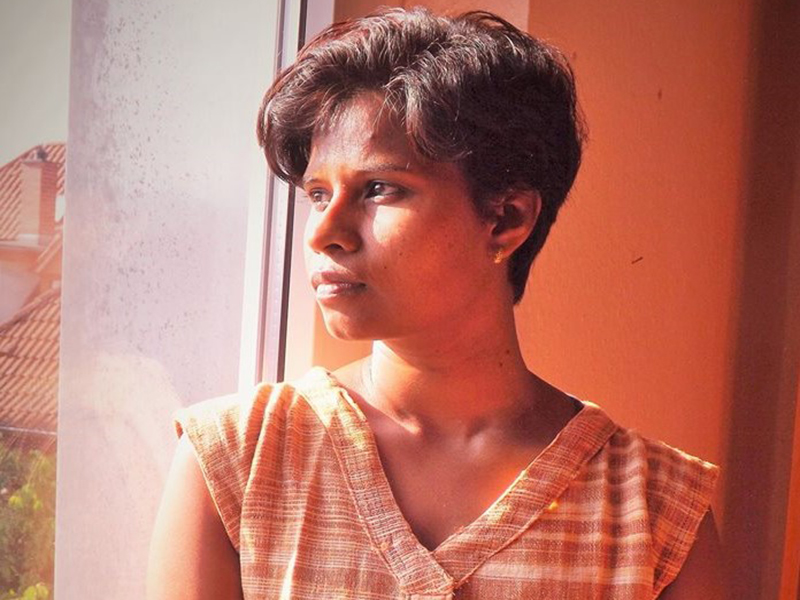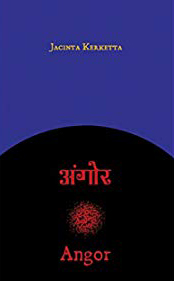
Jacinta Kerketta is a young poet, writer and freelance journalist, belonging to an Oraon Adivasi community of West Singhbhum district. She writes in Hindi. In her poems, Jacinta highlights the injustices committed on the Adivasi communities, along with their struggles. Her poems are also important cultural and artistic documents of Adivasi worldviews. Jacinta is the author of two bi-lingual (Hindi and English) full-length collections of poems – Angor (Adivani, Kolkata) and Jodon Ki Jameen (Bharatiya Jnanpith, New Delhi). GroundXero talked to Jacinta Kerketta about her poems, the politics of her poetics, representation of Adivasis in the media, and the politics of literary festivals. The original interview was conducted in Hindi.

This Interview is Done by Ground XERO Team in 2018 (Republishing here from their Website)
GX: Can you begin by talking about yourself a little bit? (Your childhood, your schooling and student days, the Jharkhand of your childhood and youth, your youth).
Jacinta: I was born in a village called Khudposh, located on the banks of river Koel in West Singhbhum district. Our village is very close to Saranda forest, which is the biggest Sal forest in Asia. My father, Jay Prakash Kerketta, was a marathon athlete in his youth, and because of that, he got a job in the police department. Most of our time during that period was spent in the Santhal Pargana area. I attended schools in different places. Along with Santhal Parganas, I also got educated in the town of Betiya of West Champaran district (Bihar).
In 1999 we came to Chakradharpur near Chaibasa and here I studied from class eight to ten. Even before Jharkhand became a separate state, my mother returned back with the family to live in Khudposh village again. It’s only during my school days in Betiya, after we had moved there from Santhal Parganas, that I began to experience, for the first time, the behaviour of the people of the mainstream society with the Adivasis. I was darker than the other children. I realized, it’s also because of this reason that I was looked down upon. But then I began to keep the anger about these things out of my studies and I decided to compete with the Non-Adivasi children. In the school at Betiya, for the first time during exams, I came second in my class, and this gave me self-confidence. In 1999, when I came to Carmel High School at Chakradharpur, a lot of the girls there in the hostel were Adivasis from the Kolhan area.
I saw how in school the teachers often considered the Adivasi girls as inert, like a heap of mud. I vowed to destroy this notion. I made a different schedule for myself and made sure that above and beyond the routines of the hostel, I had some time for myself. I began to work towards an inner transformation. For example, I began to work towards reducing envy, rage, inner reaction and laziness and began to concentrate more on my studies.

Angor: A book of poetry, by Jacinta Kerketta
I resisted against the Adivasi girls cheating in the exams, so that they can approach life with dignity and honesty, standing on their own hard work. This is why, for most of the times, the Adivasi girls in the hostel did not like me. But my own hard work paid off, and in 8th class, I came first in the half-yearly exams. That was a huge achievement for an Adivasi girl living in the hostel. That was when I saw that the non-Adivasi teachers were not happy about my achievement and they were angry that I had left the non-Adivasi girls behind. I used to note down all these details. I was observing the inside and outside conditions of both the Adivasi and the non- Adivasi society. During my youth, I used to think a lot, and that’s why, I used to spend a lot of time alone. Even when I was a child, I didn’t have too many friends. But those children who became close and began to understand my travails, they remained close to me forever. And I began from childhood to understand the conditions even of the children.
I began to write from the time at Carmel High School at Chakradharpur. I wrote frequently for a magazine called Rahi, which used to be published from Ranchi, to be distributed in all the mission schools in the country, even at Andaman and Nicobar, and elsewhere. I made a few pen-friends during school days. I used to get a lot of letters from students in other states, telling me they liked my stories and poems. A lot of the students used to say that my writing influenced their life decisions. These reactions encouraged me to keep on writing. My writing began with a small poem, whose title was “Bachpan” (Childhood). Then, I began to write short stories about the state of the youth, the condition within the family etc. I wrote short stories for this magazine called Rahi for about five years. Some of the students who grew up with me, still remember me because of this magazine. This is the journey of my school days.
GX: When and how did you decide to become a journalist?
J: I used to write stories and poems during school life. But I had never thought about joining the field of journalism. In 1999, when I entered the eighth class in Carmel High School at Chakradharpur, I often used to visit my village.
At that time, there was an incident in Manoharpur town. An Adivasi man and an elderly Adivasi woman who were working in their fields, were attacked by 10-20 non-Adivasi armed men of the Rajwade clan. The Adivasis were beaten, chased and dragged out of the field to the main road, where the man was killed. It was alleged that the two had sacrificed a girl child for the sake of better crops. The newspapers, too, had published the same story.
Later, on my father’s enquiry, the police told him as a confidential matter, that someone had raped and killed the girl and thrown her body onto the fields of that Adivasi person and later came with a group of 10-20 people to kill the latter, thus giving the story a different turn, and getting away with it. I don’t know whether the real culprits were punished ever or not. But the older woman was thrown into prison. When she came out of the prison, she died. Mother told us about this incident, and then I learnt that the victims were no other than my uncle and my grandmother, who had gotten killed.
I shuddered, listening to this heart-wrenching tale. My mother told me, the police keep doing rounds in my village, and the villagers were in mourning. They were simply reluctant to let any non-Adivasi outsider enter the village. Mother told me, the killers were exactly those non-Adivasis, with whom my uncle had been on friendly terms, and they even used to come to the village to drink hariya, and they knew the times when my uncle was there in his fields. When I got to hear about the news that has been circulated in the newspapers, I began to think, who will write such stories from our perspective. The newspaper is theirs. The power, too, belongs to them. It was then that it struck me that I should study journalism, and that I should work for the newspapers. It was in school itself that I decided that all my life I would work as a writer in such capacities, and I am continuing to live that resolution.
GX: Tell us a little bit about your journey towards your first book of poems? Was there a specific incident that inspired you?
J: The first poem I wrote was about my mother and childhood. The title of which was ‘‘Bachpan’’. It was a small poem which was published for the first time in Rahi Magazine in 1999. That was my first publication in a magazine, and it gave me encouragement to go ahead and write more. Writing this poem had a lot to do with my own childhood and the family situation. My parents didn’t share an amicable relationship. My father often used to drink and he would fight with my mother. But we were living within the mainstream society in Bihar, and a lot of new and bad things were coming into our family lives. Slowly, my father, like other men, began to be oppressive towards my mother. Like she should eat only after her husband. She shouldn’t speak to other men. And these were the dicta that the girls in our house were also asked to follow. On the one hand, he was suffering from discrimination in the police department because he was an Adivasi. He used to fight those discriminations. He would also fight against bribery. And he left his job precisely because of these reasons. But on the other hand, somehow, he had adopted a certain behaviour towards women who are considered to be the weaker sex in that other society. I witnessed it all.
Then my older brother, too, began to act in the same way. My brother wasn’t ready to accept education for girls. He was against girls leaving home, working outside of home, getting higher education and talking to boys. As a result, he became violent. These incidents had a deep impact on me. We were growing up in this environment and were also trying to cope with it. That is, is how I started to write. Simultaneously, I also began to understand how the detriments of the mainstream society are having negative effects on the Adivasi communities. My mother always gave much importance to girls’ education, and struggled a lot for our education.
O ancestral spirits!
How now do we escape,
From the conspiracies of time,
Concocted on the flames
That from the the sweltering earth rise?
Where all is slowly being roasted alive,
The air, the forests, and the soil,
And man – in body and in mind?
Lament in Songs (Geeton Ke Bilaap)
GX: How did you prepare yourself for this moment? Did you begin by writing in journals and magazines? If not, what other paths to becoming a writer did you take?
J: From 2013 onwards, I stopped working as a journalist for newspapers. But I continued as an independent, freelance journalist. I was travelling around and continued to write. Gulel.com published few of my articles, one report was even published by Tehelka. And also in some other journals and magazines. After I received the UNDP Fellowship in 2014, I began to travel to other villages in Jharkhand beyond Santhal Parganas. All along, I was continuously writing poems. But now, in my poems, it’s not just the mother who occupied the central place. I write about the struggles of the Adivasi communities, the oppression they face in the name of development, their trials and their histories. Prior to that, I had done a six month research project, and together with three other friends, I had visited all the districts of Jharkhand.
In 2014, Shri Prakash Shukla, professor of the Hindi Department of Benares Hindu University and editor of the bi-yearly literary magazine Parichay, had come to Ranchi. When he heard my poems, he wanted to publish them in Parichay. In 2014, eight poems were published in Parichay. After that, five poems were published in the prestigious journal Naya Gnanodaya, published by Bharatiya Gnanpith, with a special note by the editor.
I read some of the poems that were published in this magazine in a seminar in Orissa. I had gone to this seminar at the insistence of the famous Jharkhandi documentary filmmaker, Meghnath. The seminar was organized by an Adivasi solidarity network from Germany, and it was called Adivasi Coordination. It was in that seminar that I met Ruby Hembram, and Luis Gomez of Adivaani Publishing. They talked to me about publishing a collection of poems, and I agreed. Once the seminar was over, the organizer of the seminar, Johannes Laping, asked to see the poems I had read there. A few days later, his email arrived. It was a really thoughtful note. He wrote, that many years ago, he had cried seeing his mother on her deathbed, and it is after reading these poems, that he found that his eyes were welling up. He asked for the permission to translate these poems into German, and Draupadi Verlag agreed to publish them in Germany. That’s how, in 2015, first GLUT, a Hindi-German edition of my poems, was published. Later, during the same year, adivaani Publishing, Kolkata, came out with the Hindi-English version — Angor.
GX: You are a journalist and a poet. To what extent does your work as a journalist inform your work as a poet and vice versa? Do you ever see any contradictions in the two roles? What does poetry allow you to do that journalism doesn’t?
J: When I was a journalist, I always thought that when Adivasi journalists are work
No posts
No posts
No posts
No posts

Comments